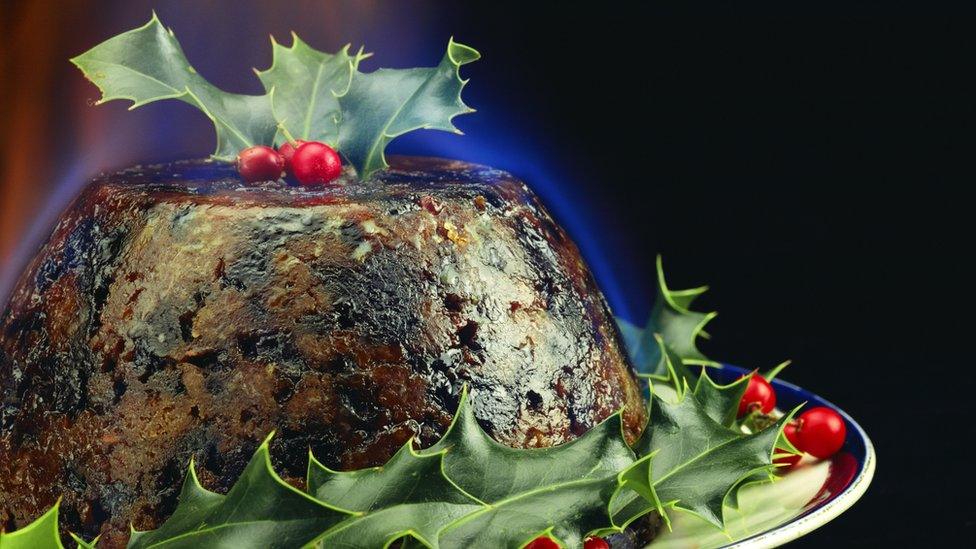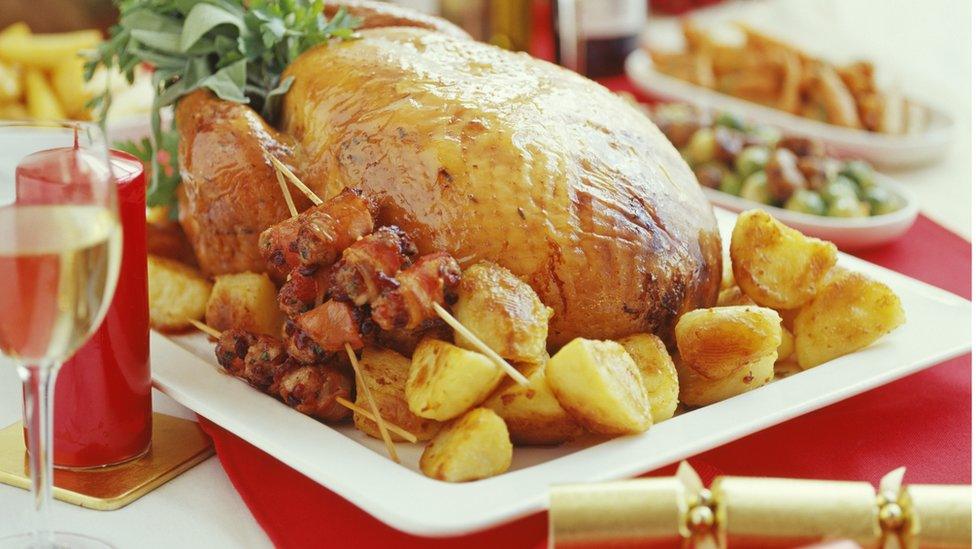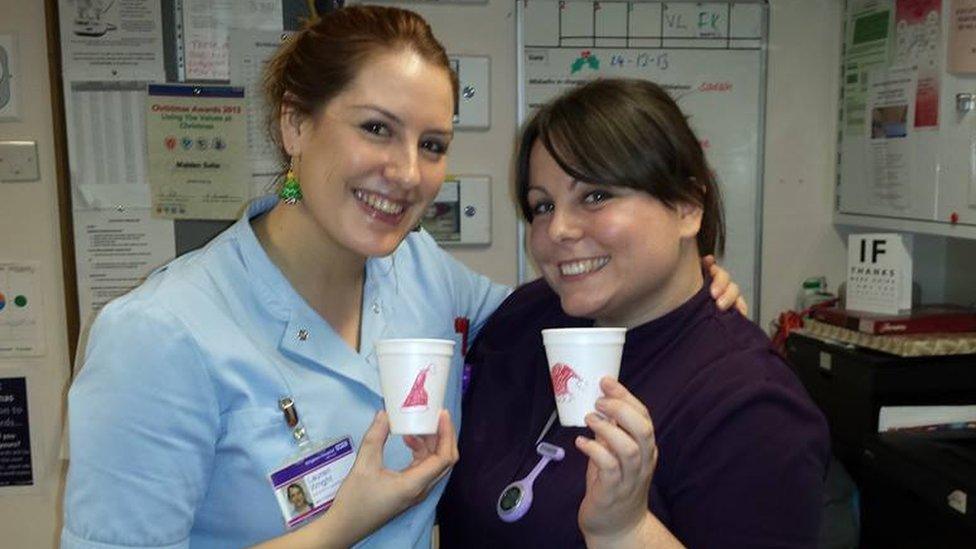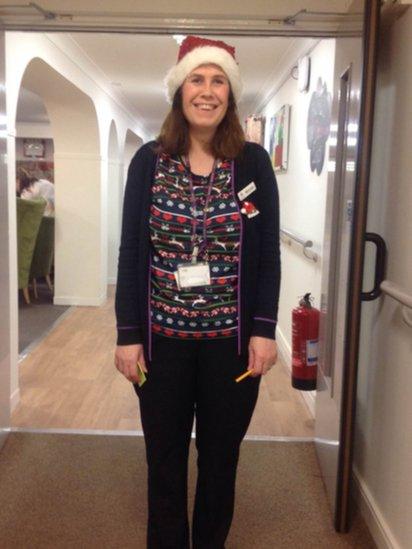The highs and lows of being a Christmas Day worker
- Published

A third of all those working on Christmas Day are nurses, care workers and healthcare assistants
While most people are tucking into their turkey on Christmas Day, many are working - particularly in the health and social care sectors.
It's estimated that about 136,000 care workers, more than any other group, are at work on 25 December.
Together with nurses and healthcare assistants, they make up almost a third of all those working on Christmas Day.
Doctors, midwives and paramedics are also in demand to keep hospitals and emergency services fully functioning over the festive season.
So what is it like to work on Christmas Day? And what are the best and worst bits of missing out on a festive family lunch?

Pamela Gildea, 35, coronary care emergency unit nurse at the NHS Golden Jubilee Hospital, Clydebank
"We deal with patients who have had heart attacks, who need an emergency procedure to clear a blockage in their artery and a stent put in place quickly.
We are a specialist centre so patients can be referred from hospitals right across the west of Scotland. They might arrive via helicopter or be delivered by ambulances to our door.
I've worked on two Christmases before - one was fairly quiet for the whole day and the other time there were lots of emergencies.
The shift is 12 hours long, from 7.30am until about 8pm usually.

Pamela Gildea enjoys the party atmosphere in her unit
The best bit is the food we all share during the day. There is no canteen open, apart from in the morning, so the staff all bring in food and try to sit down together at some point and eat. I get on with my colleagues really well so it's always an enjoyable time.
Staff make lots of cakes and we use the microwave to heat up other party food.
There's a real party atmosphere because we all want to enjoy the day - and we don't forget the patients either.
We wrap up presents for them and take round a stocking full of surprise gifts.
It's a small unit so there will only be four staff nurses and a doctor there on Christmas Day.
This isn't an easy job and sometimes it can be traumatic. We've had cardiac arrests on Christmas Day before. A colleague of mine said she will never forget the death of a young woman in the unit a few years ago.
I know the families of the patients who come here will always remember us and how we cared for their loved ones, so it's important to make a difference on this day of all days.
Working here makes me appreciate how lucky I am."


The turkey and trimmings will have to wait... for many healthcare workers on Christmas Day
Sarah-Louise Laing, midwife at Kingston Hospital in south-west London
"Christmas Day is lovely, it really is. People are always surprised when I say that but it's the most exciting day of people's lives when they are giving birth and if it's happening on Christmas Day then it just makes it even more special.
I might be away from my family but I feel part of other people's families on that day.
I'm going to be on call from midnight on Christmas Eve to midnight on Christmas Day for any home births which means it's my job to go and attend to any woman in labour at a moment's notice if she has chosen to have her baby at home.
Home births are becoming more popular. There are three or four a week in this area. Sometimes two happen at once and more often than not they arrive during the night!
I am the first on-call midwife on Christmas Day - a second midwife will also attend the home birth as delivery gets closer, just for safety reasons.

Sarah-Louise Laing (on the right) and a colleague celebrated Christmas last year at Kingston Hospital
It's amazing how many women will try not to have their babies on Christmas Day - but if they do we make a huge fuss of them.
If I'm in the unit on the 25 December, where about 18 to 20 midwives work, there will be lots of home-baking being handed round.
Being a good baker seems to be part of the midwife's job description so there are always mince pies, cakes and stacks of sweeties on offer.
There's also a competition among the hospital units to create the best decoration. Last year the maternity unit created an advent calendar with the babies born each day written in each window.
I might be at home for some of Christmas Day but I won't be able to relax or have a drink until midnight because I'll still be on call.
It is a privilege to do this job. I might be sacrificing a Christmas dinner at home with my husband, but it's still a very special day for me."

Who is working on Christmas Day?
Care workers - 136,000 people
Nurses - 77,000
Healthcare assistants - 43,000
Chefs and cooks - 33,000
Security guards - 31,000
Clergy - 26,000
Police officers - 21,000
Medical practitioners - 15,000

Michele Alderson, activities co-ordinator at Anchor's Cranlea care home for the elderly in Newcastle
"The most important thing is getting Santa Claus' parcel run sorted for Christmas Day.
All 36 residents get a gift and this year we are making each one very personal. We have been picking items we know they will like - embroidered hankies, chocolates, face cream, comedy DVDs, for example.
It's so lovely to see their faces when they open up the gifts.

Michele Alderson organises parcels and musical fun for the residents
That's how Christmas Day starts here, but there have been activities going on all through December. Music is a common thread - it's something older people can relate to and it often brings back nice memories.
We've had carol singing, visits from a gospel choir and a community choir and a big friends and family musical event too.
Trips to the local church and the theatre have also been organised, so it's been a packed few weeks.
On Christmas Day I will turn up early along with a full compliment of staff, just like any other day, so care workers, catering staff, kitchen assistants and the care home manager will all be here.
We all sit down with the residents to enjoy a full English breakfast before they tuck into the traditional turkey and trimmings later on with a glass of wine or sherry. Family members can join them for lunch as well.
If I can leave on time, I hope to be able to get home in time to make lunch for my family.
So many people work on Christmas Day now that it doesn't seem a big deal to be working."